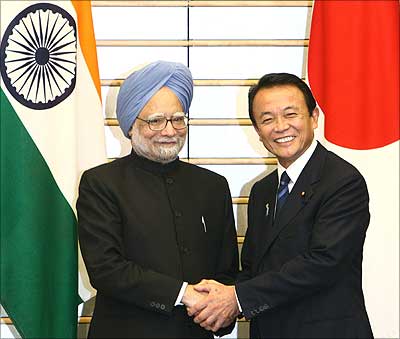|
|
| Help | |
| You are here: Rediff Home » India » News » First Look |
|
 Notwithstanding the NSG waiver for New Delhi [Images], Japan [Images] on Wednesday appeared non-committal on civil nuclear cooperation with India even as the two countries agreed that atomic power could play an important role as a sustainable and non-polluting source of energy in meeting the growing global demands.
Notwithstanding the NSG waiver for New Delhi [Images], Japan [Images] on Wednesday appeared non-committal on civil nuclear cooperation with India even as the two countries agreed that atomic power could play an important role as a sustainable and non-polluting source of energy in meeting the growing global demands.
The two sides "shared the view that nuclear energy can play an important role as a safe, sustainable and non-polluting source of energy in meeting the rising global energy demands," said a joint statement issued at the end of the summit talks between Prime Minister Manmohan Singh [Images] and his Japanese counterpart Taro Aso in Tokyo.
The statement did not say whether Japan, which has serious reservations on nuclear issues for historic reasons, would cooperate with India in the civilian nuclear sector.
Earlier, India had said it understood the sensitivities of Japan on the nuclear issue. New Delhi, pleased with Tokyo's backing for India's case at the NSG and IAEA, said it would be ready when Tokyo thought it could join hands with it.
Singh and Aso shared the view that international nuclear disarmament and non-proliferation efforts should be reinforced. They also stressed the importance of strengthening their efforts towards the shared goal of achieving a "world free of nuclear weapons."
The two prime ministers condemned terrorism in all its forms and manifestations, saying that it constitutes a "serious threat" to international peace and security. They welcomed efforts taken by both countries to combat the menace.
The two sides reaffirmed their desire for expeditious conclusion of negotiations on the Comprehensive Convention against International Terrorism [Images] at the United Nations.
Singh and Aso also discussed the current international financial crisis and shared the view that the global economy was facing uncertainty, including financial difficulties.
They said it was important for the two major Asian nations to continue discussion for the stability and growth of the region and the world.
They recognised the need for joint efforts by all consuming and producing countries to mitigate the impact of high and volatile oil prices, which hamper global growth and development.
Singh and Aso also expressed concerns that global food prices remain at high level and called for greater collaborative efforts to address the challenge of the global food security.
They also discussed the current state of the negotiations of the World Trade Organisation Doha Development Agenda and reaffirmed their will to continue their cooperation towards an early and successful conclusion of the negotiations with a balanced and comprehensive outcome.
The two prime ministers reaffirmed the importance of maintaining close cooperation between the two nations in various international fora.
They shared the view that the reform and expansion of the UN Security Council, in both the permanent and non-permanent categories, is central to the process of a "comprehensive reform" of the UN.
They welcomed the decision of the UN General Assembly to commence inter-governmental negotiations not later than February 28, 2009.
India and Japan, part of the G-4 initiative, also decided to continue their close cooperation to achieve expeditious forward movement towards a genuine reform of the UN Security Council, so as to make it more representative, credible and effective.
In this context, Singh and Aso stressed the importance of G-4, which also includes Brazil [Images] and Germany [Images], bilateral consultations as well as their engagement with the larger UN membership.
The two prime ministers expressed satisfaction at the growth of bilateral trade which is expected to reach $20 billion by 2010.
They also expressed satisfaction over the "substantive progress" achieved on the Economic Partnership Agreement/Comprehensive Economic Partnership Agreement and hoped that the negotiations would be concluded at the "earliest possible time."
They expressed their belief that this EPA/CEPA would be mutually beneficial and would fully harness the true potential of economic partnership.
Image: Prime Minister Manmohan Singh meets with Japanese Prime Minister Taro Aso at Aso's official residence in
|
|
| © 2008 Rediff.com India Limited. All Rights Reserved. Disclaimer | Feedback |